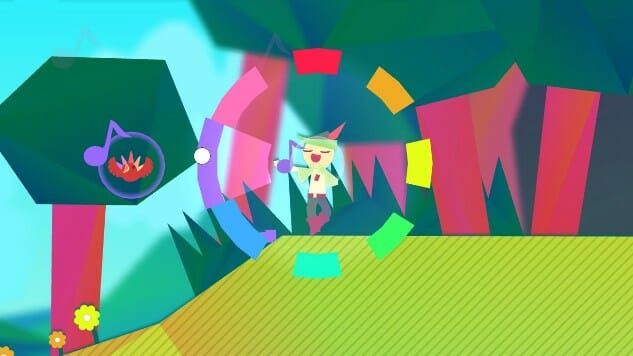
Apocalypses are pretty common in games. Either the backdrop is that the apocalypse has already happened, and we’re in a Mad Max-tinged “fight for your life” in the wasteland kind of deal, or it’s the looming apocalypse, the one that can be stopped if the hero comes along and does all the right things and finds all the right stuff.
In both scenarios the goal is individualistic: The story revolves around the central actor, and it’s through their failures or successes that the overall plot will succeed or fail. But it’s not the only way you can tell a story about an apocalypse, and Wandersong is trying to break that pattern.
I’ve had my eye on Wandersong for a while. Visually and musically, the game stands out: it feels handmade in ways more than just the aesthetic. It’s very clearly a game about group efforts, and not just in its title screen (proudly displaying that it’s a game made by Gord, Em and Greg).
Wandersong is about a bard. A bard who, at the beginning of the game, is told by a goddess that he is not the hero. And it’s a motif that the game returns to often, about being a hero and what being a hero really means.
Because here’s the thing about heroes: They generally solve things by themselves. The heroic journey is ultimately a personal one, something that leaves the hero victorious by the end at their goal. Wandersong is a game about people who aren’t allowed to do that. People for whom the only shot at making a difference must come from joining with others, not going at it alone.
There are multiple times in Wandersong that characters espouse the frustrations of group action versus singular action. And they’re the same sort of frustrations that are echoed in contemporary, real-world discussions of how to do better: “What can I do” lamentations. “The problem is too big” frustrations.
I don’t think Wandersong is trying to say that individual small actions can change the world. That’s the philosophy behind things like recycling campaigns or pushes for the public to compost more, ignoring that the much greater root causes of environmental damage come from industries and megacorporations, the type of social structures that are nearly untouchable by the average citizen.

Wanting a ‘hero’ when up against insurmountable odds makes sense, then: Because the assumption is that a singular actor when given enough power can more easily topple an otherwise insurmountable enemy. If only we had the right billionaire come along, perhaps they could tell oil companies to stop drilling.
What this viewpoint ignores is the possibility of mass action, of large groups of people exerting their will as a unified force to enact change on a much greater level than everyone making sure to take 15 minute showers instead of 30 minute ones.
If this sounds like I’m out in the weeds on this, that’s because these are the questions that came to mind when playing Wandersong, a game that, fundamentally, is about the virtues of mass action pitted against the allure of heroic action.
To set the context in-game, the player’s Bard character (adorably smiling and nearly always chipper) is tasked with stopping an apocalypse by the goddess Eya that would wipe out all life on the planet and start a new one in its place. After trying and failing to wield the hero’s sword, the Bard realizes that there is another way to save the world: to gather the pieces of the Earthsong and unite the world in harmony, thus saving it from Eya’s reckoning.
Doing so is no simple task, as you might expect. Instead of simply conquering, the Bard must understand, listen, help as many people as possible. The goal here is not victory, but unity: creating a base of support and interconnection that is stronger than any single actor, regardless of how much power they have or that has been bestowed on them. In short, Wandersong is about… organization.
The thing about organization is that it’s not simple. What you find, while playing through Wandersong, is that each region has a different desired solution. It’s not about rallying everyone under the same flag, it’s about helping each group of people through their own problems. It’s about being a helper where you can and learning what you must do to bring about a greater harmony.
The game isn’t without its fumbles, but it successfully works even with some of its more clunky controls. The tone-wheel of singing notes is novel and interesting, but in the more rhythmically-oriented sections it can be tough to predict exactly where your control stick is going to land, making precision difficult. However, this isn’t much of a roadblock, as Wandersong rarely has moments where you’ll be failed out for missing a note
Given its focus on unity, it’s not surprising that the game always returns to ideas of harmony. It’s a game about music, after all, so the motif fits. And while playing Wandersong, I also felt like harmony was that much closer, that the greatest evils were defeatable if only we could rally together. And that’s a powerful thing for a game about a humble lil bard.
Wandersong was developed by Greg Lobanov and published by Humble Bundle. Our review is based on the PC version. It is also available for Mac and Nintendo Switch.
Dante Douglas is a writer, poet and game developer. You can find him on Twitter at @videodante.